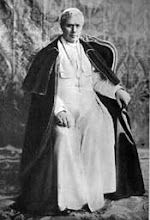Por intermédio do blogue do Buiça, tomei conhecimento de um artigo francês, propugnando a adesão da Turquia à União Europeia, eivado de falsidades bastante básicas; todavia, há males que vêm por bem, pois aproveito a ocasião para analisar a "dhimmitude", ou seja, o tradicional regime religioso-jurídico a que ficavam subordinados todos aqueles que caíam sob domínio muçulmano, mas que não se convertiam ao Islão. Irei seguir de perto as obras da historiadora britânica, de origem egípcia, Bat Ye'or, nomeadamente o seu "The Decline of Eastern Christianity under Islam - From Jihad to Dhimmitude", colocando um especial ênfase na situação do Império Otomano, na medida em que quem não aprende com os erros do passado, pode repeti-los no futuro. Para já, dou a palavra a Bat Ye'or, que exporá o processo de recrutamento dos janízaros, tropa de elite cujos membros eram provenientes na sua totalidade dos Balcãs. Este, por si só, desmente o mito da benignidade do domínio turco sobre essa região do mundo:
"Another important process of Islamization was devshirme. This practice, introduced by the Ottoman sultan Orkhan (1326-59), consisted of a regular levy, as tribute, of a fifth of the Christian children from the conquered Balkan regions. The interval between levies varied with needs. Some places were exempt: Constantinople, Jannina, Galata, Rhodes. These youngsters, aged between fourteen and twenty, were converted to Islam and entered the corps of janissaries, military militias formed almost exclusively of Christians. The periodic levies, which took place in contingents of a thousand, subsequently became annual. The Christian children were requisitioned from among the Greek, Serbian, Bulgarian, Armenian, and Albanian aristocracy and from among the children of priests. At a fixed date, every father had to gather with his sons at the central place of the village. The recruiting agents, themselves janissaries, then selected the handsomest and most robust in the presence of the qadi. No father could avoid this blood tribute on pain of severe punishment.
These levies of children gave rise to abuses, the recruiters taking a surplus of children in order to sell them back to their parents. If their poverty-stricken families were unable to redeem them, they remained slaves. To discourage runaways, children were transferred to remote provinces and entrusted to Muslim feudal masters who threated them harshly, as slaves. Removed from their families, hardened by painful experiences, and turned into fanatics by their education, these soldiers became the cruelest weapon against their own people. According to the Byzantine historian Ducas, the janissaries in the personal guard of Bayazid I (1389 - 1402) were "all hired and gathered from various Christian nations".
Another parallel recruitment system operated. It provided for the levy of children aged six to ten (ichoghlani), reserved for sultan's seraglios. Confined in the palaces and entrusted to eunuchs, they underwent a tyrannical training for fourteen years and furnished the highest hierarchy of officials to the Ottoman state. This regular bloodletting from the conquered peoples increased the Muslim population and correspondingly reduced that of Christians. The devshirme was theoretically abolished in 1656, but recruitment of ichoghlani continued until the mid-eighteenth century".
"Another important process of Islamization was devshirme. This practice, introduced by the Ottoman sultan Orkhan (1326-59), consisted of a regular levy, as tribute, of a fifth of the Christian children from the conquered Balkan regions. The interval between levies varied with needs. Some places were exempt: Constantinople, Jannina, Galata, Rhodes. These youngsters, aged between fourteen and twenty, were converted to Islam and entered the corps of janissaries, military militias formed almost exclusively of Christians. The periodic levies, which took place in contingents of a thousand, subsequently became annual. The Christian children were requisitioned from among the Greek, Serbian, Bulgarian, Armenian, and Albanian aristocracy and from among the children of priests. At a fixed date, every father had to gather with his sons at the central place of the village. The recruiting agents, themselves janissaries, then selected the handsomest and most robust in the presence of the qadi. No father could avoid this blood tribute on pain of severe punishment.
These levies of children gave rise to abuses, the recruiters taking a surplus of children in order to sell them back to their parents. If their poverty-stricken families were unable to redeem them, they remained slaves. To discourage runaways, children were transferred to remote provinces and entrusted to Muslim feudal masters who threated them harshly, as slaves. Removed from their families, hardened by painful experiences, and turned into fanatics by their education, these soldiers became the cruelest weapon against their own people. According to the Byzantine historian Ducas, the janissaries in the personal guard of Bayazid I (1389 - 1402) were "all hired and gathered from various Christian nations".
Another parallel recruitment system operated. It provided for the levy of children aged six to ten (ichoghlani), reserved for sultan's seraglios. Confined in the palaces and entrusted to eunuchs, they underwent a tyrannical training for fourteen years and furnished the highest hierarchy of officials to the Ottoman state. This regular bloodletting from the conquered peoples increased the Muslim population and correspondingly reduced that of Christians. The devshirme was theoretically abolished in 1656, but recruitment of ichoghlani continued until the mid-eighteenth century".
















0 comentários:
Enviar um comentário